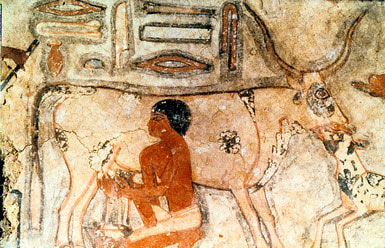
Should Adult Humans Drink Milk? Study of Neolithic Farmers May Have the Answer
Many would remember the days when a milk trolley would be rolled out during morning recess at school and all the children would come running for their daily glass of milk, or the TV images of energetic children racing around the playground with the message to drink milk for healthy bones. However, scientific research has questioned whether drinking cow’s milk is actually good for us at all. The answer to this question may lie in a study of our ancient Neolithic ancestors who first began the practice of dairy-related animal husbandry.
A multidisciplinary team of scientists from an EU-funded initiative, which began in 2009, examined the role played by milk, cheese, and yogurt in the early colonization of Europe and found that until 8,000 years ago, humans were only able to digest lactose, a form of sugar present in milk, during childhood and that as adults they lost the ability to produce endogenous lactase, the enzyme required to break down lactose.

Milking a cow, wall painting from the tomb of Methethi, Saqqara, Ancient Egypt (c 2371 - 2350 BC). Image source.
However, shortly before the first farmers settled in Europe, a genetic mutation occurred in humans that resulted in the ability to produce lactase throughout their lives. Increasing numbers of adults in Central and Northern Europe were since been able to digest milk.
Just 5,000 years ago, lactase persistence was almost non-existent among the population but researchers believe that extensive positive selection and recurrent waves of migration were responsible for this development.
"To appreciate the significance of our findings, it is important to realize that a major proportion of present-day central and northern Europeans descend from just a small group of Neolithic farmers who happened to be able to digest fresh milk, even after weaning," explained Anthropologist Professor Joachim Burger of Johannes Gutenberg University Mainz (JGU). This reveals that far from being normal, the ability to digest milk is only the result of a strange genetic adaption.
Scientists point out, however, that 60% of modern-day people still lack the enzyme for breaking down lactose and just don’t know it, meaning that they experience a wide range of digestive and allergy problems which they have never had attributed to their milk-drinking.
Another argument that has been recently been debunked is that drinking cow’s milk increases bone strength and prevent osteoporosis. In fact, the skeletons of our Palaeolithic ancestors, who did not drink milk, reflect great strength and muscularity and a total absence of advanced osteoporosis, possibly due to the fact that research has shown we can get as much calcium as we need from grains and vegetables alone.
Of all the mammals on earth, human beings are the only ones who continue to drink milk beyond babyhood. Whether this should be the case or not is now in doubt.
















Comments
Have you guys ever heard of Kefir or kephir? It's an old and mysterious yeast/bacterial fermentation starter that resembles a white grain or small pearls. Once placed in a milk (cow, goat or sheep) the fermentation process begins and only takes 12hrs to turn 500ml into yogurt-like substance as a result of the fermentation, very little lactose remains in kefir. People with lactose intolerance are able to tolerate kefir, provided the number of live bacteria present in this beverage consumed is high enough.
I say "mysterious" because nobody knows exactly where it came from, it has it's origin in the north-caucasian regions although some sources see a connection to Turkic köpür.
liar liar pants on fire."Of all the mammals on earth, human beings are the only ones who continue to drink milk beyond babyhood" that is false. The reason why most members of any mammal family does not continue to drink milk past their babyhood is because parents force them to renounce it. In rare cases (this has been noticed on chimps) the "infant" manage to trick their parents into prelonging this period well into adulthood. Also compare bone density of people today that had until reaching adulhood (18 years) a diet rich in milk with those that did not. Do not compare random samples and then say it is proof.
There is growing research that suggests it is better to give infants breast milk as opposed to proccessed cows milk because it has more nutrients.
Troy Mobley
It is in all probability a geographic thing I with Middle Eastern genetic origins (paternal) cannot digest Lactose whilst my mother (Celtic) could. This is probably too simplistic but the answer is there. somewhere, needs more research.
I also stopped drinking milk a few years ago and noticed improvements in my health. However I still can’t get rid of cheese and eat it from time to time, as rare as i can
Pages